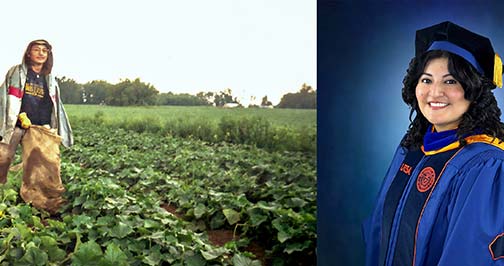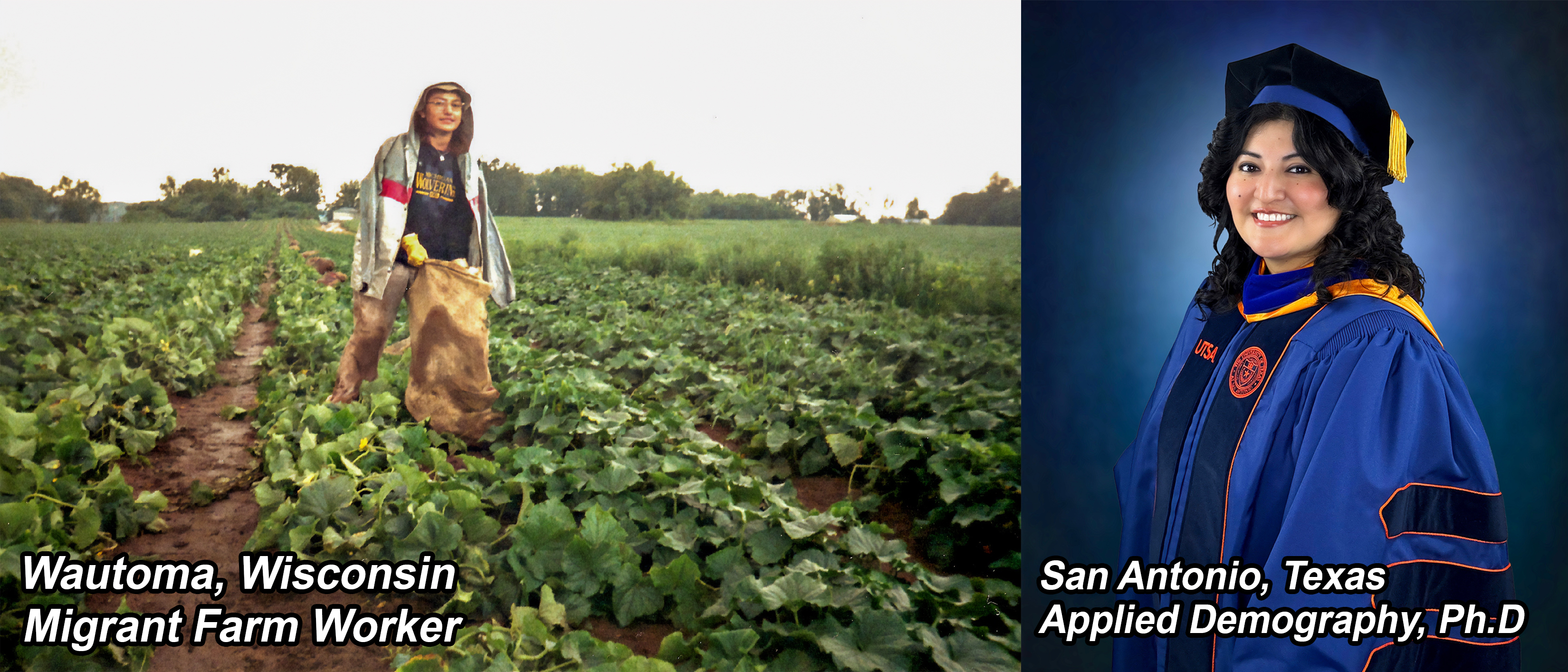Posted on October 15, 2024 by Julie González

Gonzalez in the fields and at graduation
Dr. Julie A. González's journey to a career in population health began with her family's annual migration from South Texas to the Midwest, where they worked as migrant farm workers. These early experiences exposed her to the environmental hazards faced by marginalized communities and sparked her interest in environmental issues.
Observing Global Environmental Issues Through Travel
Encouraged by her mother's emphasis on education, independence, and the importance of learning both from books and through real-world experiences, González backpacked across five continents during her college years. Immersing herself in different cultures and landscapes, she observed environmental challenges firsthand. In Egypt, she observed poor water quality affecting both locals and visitors. In Vietnam, she encountered communities still dealing with the long-term health and environmental effects of Agent Orange. Living in China, she experienced severe air pollution that impacted her health. Across every country she visited, González saw firsthand the far-reaching consequences of environmental degradation and its direct impact on public health. Returning to the Rio Grande Valley, she observed similar challenges—extreme heat, flooding, and pollution affecting her own community.

Choosing UTSA
Determined to be part of the solution, González sought a doctoral program that would empower her to address environmental issues affecting population health through a demographic perspective. She found the perfect fit in UTSA's Ph.D. program in Applied Demography. The program's focus on practical research and comprehensive training in tools such as R Studio, Geographic Information Systems (GIS), and machine learning resonated with her aspirations. This integration of interdisciplinary coursework with immersive, hands-on learning provided her with advanced quantitative and spatial analysis capabilities. With this expertise, she is positioned to conduct research that can deliver data-driven solutions to complex environmental and public health challenges.
Beginning her doctoral program in 2020, during the unprecedented challenges of the COVID-19 pandemic, required resilience and adaptability. The support of her professors, particularly Dr. Corey Sparks, was instrumental in navigating this period. Beyond being an outstanding educator in advanced statistical analysis and R coding, Sparks was a deeply committed graduate advisor, ensuring she remained on track with her coursework, attentively addressing her concerns and offering critical academic guidance. Dr. Lloyd Potter, as Texas State Demographer and professor, offered employment opportunities that gave González valuable hands-on experience in demographic work, directly contributing to her professional growth.

And then there was Dr. Johnelle Sparks—nothing short of a queen! Her mentorship transcended the typical boundaries of academic guidance. She shaped González’s intellectual and personal journey in profound ways, balancing her deep expertise with humility and genuine care. Her approach fostered a space where learning was meaningful, and challenges were met with patience and encouragement. Even after graduation, González still seeks out career advice from both Sparks,’ a testament to their lasting influence on her academic and professional life. Dr. Johnelle Sparks’s mentorship not only empowered González, but her work enhances UTSA’s reputation and caliber, showcasing how the university is elevated by having distinguished professors like her who exemplify academic excellence and a genuine commitment to student success.
“Dr. González is a great example of how developing a toolkit in demography and research methods can lead to strong interdisciplinary collaborations,” said Johnelle Sparks, professor of demography. “It is impressive to see her stepping out of her comfort zone to address her research passion – environmental health and justice with a focus on the needs of Latinos. Jules has been able to blend her lived experiences, research training and interests, and post-doctoral experience in a way that is new and exciting!”
Summer at AIR
A pivotal moment in González's academic career was her summer internship at the American Institutes for Research (AIR). During this time, she contributed to the development of the Pipeline Partnership Program (P3) Fellowship, a prestigious three-year program for advanced doctoral students at select universities, including UTSA, Georgia State, and Howard University. The Fellowship is designed to increase the diversity of research and technical assistance work conducted in the behavioral and social sciences by supporting students in the US and Africa as they tackle understudied questions related to systemic inequality. By helping reduce barriers to dissertation completion and opening career pathways, the program equips future leaders to use evidence as a tool for justice and equity. Through her involvement, González played a key role in creating opportunities for students to pursue doctoral degrees, access valuable research opportunities and embark on impactful careers in academia and beyond.
“Dr. Gonzalez is a remarkable individual. She is curious about the environment around her, self-motivated, steadfast in her convictions, kind and loyal, and determined to make the most of every opportunity,” said Jillian Reynolds, senior program manager at AIR. “Her commitment to environmental justice research reflects her passion for creating equitable solutions for all communities. Working with her on the foundation for the P3 Fellowship was a privilege, and I look forward to seeing her research career progress.”
Postdoc in D.C.
After earning her Ph.D., González accepted a postdoctoral position at American University in Washington, D.C., working with the Center for Environment, Community, and Equity (CECE). CECE is dedicated to addressing environmental and social inequities by conducting interdisciplinary research that explores the intersection of environmental justice, community well-being, and public health. Alongside her postdoctoral work, González established a collaboration with NASA Langley, where she conducts research focused on measuring air pollution levels across the United States. By integrating this data with health outcomes and sociodemographic factors, her work aims to provide a detailed understanding of air pollution’s impact on diverse communities nationwide.
Dr. González’s commitment to environmental justice and public health extends well beyond academic research. She has been invited to speak at conferences addressing climate adaptation, the Latino community, and public health resilience—reinforcing her dedication to ensuring that her work not only informs policy but also has a direct impact on vulnerable populations. Recognizing her expertise, Climate Power en Acción, a non-governmental organization, sought her out as an expert source for Spanish media, where she engages Spanish-speaking audiences on pressing issues such as climate change, environmental justice, and public health. Further amplifying her community engagement, González organized and moderated a panel discussion titled "Environmental Equity, Latino Communities, and Election 2024" at the School of International Service at American University earlier this month. The event discussed the intersection of environmental challenges, Latino communities and electoral engagement, with a particular focus on the critical role of public health resilience in these discussions.
“Jules works with colleagues at the intersection of academic research, emerging government technology, a non-profit’s commitment to equity and inclusion, and media outreach which is an amazing combination and provides potential for advancing environmental health equity that I have not seen before,” Sparks said. “She is making important contributions that will have a lasting impact for Latino health and well-being.”
These accomplishments are just one part of González’s journey. From working as a migrant farmworker to advocating for environmental justice on a national stage, González’s success is a testament to her mother’s unwavering commitment to her education, the mentorship and support she received at UTSA from her professors, and the pathways to success provided by AIR. She is deeply grateful for the guidance, opportunities and encouragement that have shaped her journey, knowing that her achievements are built on the support of others. Her story is a reminder that progress—both personal and societal—happens when individuals are uplifted by their communities and equipped with the tools to make meaningful change.

